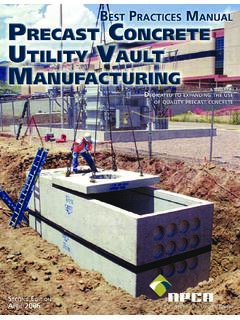Transcription of A Roadmap to Developing an Effective Internship ... - Precast
1 A Roadmap to Developing an Effective Internship Program in the Precast Concrete Industry 1 | P a g e This manual contains step-by-step instructions for setting up an Internship program in your plant. It was produced by Ayaz Ahmed for the NPCA Foundation and the PCI Foundation. This manual may be customized to correspond with your plant s personnel and/or Internship policies. For additional information on Foundation activities, please visit: NPCA Foundation PCI Foundation TABLE OF CONTENTS Section 1: Legal Considerations and the Intern Page 2 Section 2: Benefits of an Internship to your Organization Page 6 Section 3: Setting Goals and Expectations Page 8 Section 4: Conducting an Internal Audit Page 12 Section 5: Creating an Internship Program on Paper Page 19 Section 6: Creating Job Descriptions and Learning Outcomes Page 25 Section 7: Creating Meaningful Work Page 32 Section 8: Formal Training Development Page 34 Section 9: Sample 10-Week Internship Program Page 37 Section 10: Marketing the Internship Opportunities Page 50 Section 11.
2 Recruiting the Intern Page 58 Section 12: Making a Competitive Job Offer Page 74 Section 13: Managing the Intern Effectively Page 83 Section 14: Developing an Effective Performance Evaluation Process Page 86 Section 15: Your Future Plans for the Intern Page 95 Section 16: Frequently Asked Questions Page 101 2 | P a g e A Roadmap to Developing an Effective Internship Program in the Precast Concrete Industry SECTION 1 Legal Considerations and the Intern 3 | P a g e How Does Hiring an Intern affect me legally? This is one of the first questions that most employers ask as they embark on the path to creating an Internship program in their organizations. Hiring an intern is very similar to hiring a full-time employee with one major difference: Should I hire an intern on a paid or unpaid basis?
3 The Department of Labor has established regulations that control whether or not an Internship must be qualified as paid or unpaid. If an Internship qualifies as a paid position, interns legally must be paid the federal minimum wage for the services they provide within the for-profit or private sector. They must also be paid overtime. Both regulations fall under the Fair Labor Standards Act. In addition, the Department of Labor has developed six new criteria that an employer must apply to determine whether an Internship legally qualifies to work without compensation. The following six standards must be met in order to establish an intern qualifies to work unpaid: 1. The Internship , even though it includes actual operation of the facilities of the employer, is similar training which would be given in an educational environment.
4 2. The Internship experience is for the benefit of the intern. 3. The intern does not displace regular employees, but works under close supervision of existing staff. 4. The employer that provides the training derives no immediate advantage from the activities of the intern; and on occasion its operations may actually be impeded. 5. The intern is not necessarily entitled to a job at the conclusion of the Internship . 6. The employer and the intern understand that the intern is not entitled to wages for the time spent in the Internship . ( Department of Labor Wage and Hour Division) 4 | P a g e Assuming the Internship qualifies under all six factors as an unpaid Internship , the FLSA does not consider an employment relationship to exist.
5 Therefore, the intern no longer qualifies for minimum wage and overtime requirements, under the law. That being said, remember, the Internship 's goal is to attract the brightest individuals to your company, so you may enhance your workforce and increase your profitability. It is in your company s best interest to offer a competitive wage and benefits to your interns. 5 | P a g e A Roadmap to Developing an Effective Internship Program in the Precast Concrete Industry SECTION 2 Benefits of an Internship to Your Organization 6 | P a g e What are the Benefits of an Internship to an Employer? 1. Find future employees. An Internship program is a year-round recruiting tool.
6 Implementing an Internship program means you have an ongoing pipeline of future full-time employees. For many, the process of recruiting and hiring is a drain on company resources. One solution is to appeal to tomorrow's staff members when they're looking for internships. Then all you have to do is choose the best when it comes time to hire. Moreover, college campuses are viral societies. This means if your organization impresses one class of interns, word will quickly spread to other classes. Soon you'll find the most sought-after student talent is interested in working with you. 2. Test drive the talent. Hiring someone as an intern is the most Effective way to evaluate their potential as a full-time employee.
7 When you "try out" candidates during a semester or summer Internship , you make fewer mistakes when it comes to full-time staffing. In addition, you avoid the pitfall of training a new hire, only to find out they're not a fit for your organization or the entry-level employee doesn't like the field. Starting an Internship program lets you benefit from added manpower, while more accurately assessing candidates. 3. Increase productivity. Speaking of additional manpower, setting up an Internship program allows you to take advantage of short-term support. The extra set of hands helps your employees be more productive, prevents them from becoming overburdened by side projects and allows them to accomplish creative tasks or think more strategically when required.
8 4. Increase employee-retention rate. The proof for the test-drive theory is in the positive employee-retention figures. According to the National Association of Colleges and Employers 2009 Experiential Education Survey, almost 40% of employers reported a higher five-year retention rate among employees they'd hired via their Internship programs. 7 | P a g e 5. Enhance perspective . It's not just the extra set of hands that make interns advantageous. Especially in an organization of only 12 or 15 employees, new people bring with them novel perspectives, fresh ideas, and specialized strengths and skill sets. These augment the abilities of your professional workforce. 6. Take advantage of low-cost labor.
9 Interns are an inexpensive resource. Their salaries are significantly lower than staff employees, and you aren't obligated to pay unemployment or a severance packages should you not hire them full time. Moreover, while their wage requirements are modest, they're among the most highly motivated members of the workforce. 7. Find free-of-charge. allows you to post your employer profile completely free of charge. This means you get extensive exposure to the top colleges and candidates without putting a dent in your recruiting budget. 8. Give back to the community. As a small business, you likely rely on community support. Creating an Internship program is an excellent way to give back.
10 Hiring interns not only helps students in your community get started, it enhances the local workforce as a whole. 9. Support students. Internships provide students numerous perks. They gain experience, develop skills, make connections, strengthen their resumes, learn about a field, and assess their interest and abilities. Offering a paid Internship is particularly beneficial because it enables economically disadvantaged youth to participate. Students who have to help fund their own schooling will need a job, regardless. Providing an Internship allows that job to facilitate a positive future. 10. Benefit your small business. When looking for full-time work, top talent often go to big-name businesses.

















